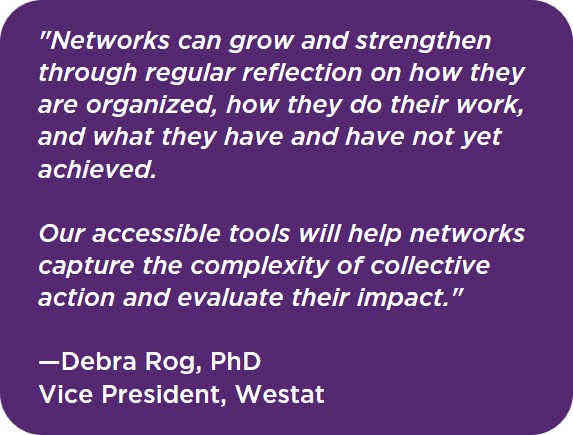 Reflection and continuous quality improvement are essential processes for both effective movement building and trauma-informed practice. That’s why we’re excited to share our latest resources focused on network evaluation.
Reflection and continuous quality improvement are essential processes for both effective movement building and trauma-informed practice. That’s why we’re excited to share our latest resources focused on network evaluation.
The toolkit, briefs, and journal article featured below were developed in close partnership with our colleagues Debra Rog, Tamara Daley, and Nanmathi Manian at Westat and informed by their cross-site evaluation of MARC.
To read more about the evaluation and access the full Westat reports, visit our MARC 1.0 Initiative webpage.
TOOLKIT—Do-It-Yourself Strategies for Network Reflection and Evaluation
This toolkit offers strategies that network members can use to help evaluate their collective efforts, including:
- Logic Models & Evaluability Assessment
- Social Network Analysis
- Outcome Harvesting
For each tool, we provide a definition and description, guidance on how to use it, and recommended participants. We offer a few key tips from the MARC Initiative and resources to further guide the work.
In an effort to maximize learning from the MARC 1.0 Initiative evaluation reports, HFP and Westat convened a work group of thought partners with network experience to select key findings for deeper exploration. The first two briefs in the resulting series are now available.
We wish to thank Renée Boynton-Jarrett, Ruben Cantu, Kathryn Evans, Heather Larkin, Geof Morgan, Aditi Srivastav Bussells, and Holly White-Wolfe for their contributions to the work group.
BRIEF 1—Making Change Happen: Roles Played by ACEs, Trauma, and Resilience Networks
Networks are often distinguished by the pattern of their work that characterizes how they achieve most of their outcomes. Drawing from across the MARC 1.0 Initiative sites, this brief describes key roles networks can play in effecting community change.
BRIEF 2—Strengthening ACEs, Trauma, and Resilience Networks
In this brief, we highlight two dimensions of network strengthening—engaging new sectors and increasing collaboration—and provide examples of steps taken by the MARC 1.0 Initiative sites. We also describe the multi-sector nature of these networks and how this changed over time.
BRIEF 3—Context Matters: How ACEs, Trauma, and Resilience Networks Incorporate Local Realities to Promote Resilience
Added to the collection on 9/15/2021
The various settings in which the networks were situated provided both challenges and assets. This brief highlights how the networks incorporated local realities to promote resilience by leveraging their strengths and capacities to navigate three types of contextual factors: natural disasters, geography, and cultural identity.
JOURNAL ARTICLE—Opportunities for Psychologists to Enact Community Change Through ACEs, Trauma and Resilience Networks
American Psychologist’s recent special issue on Adverse Childhood Experiences (ACEs) features findings from the MARC cross-site evaluation!
HFP's Clare Reidy and Leslie Lieberman—with coauthors Debra Rog, Nanmathi Manian, and Tamara Daley from Westat—spotlight the power of ACEs, trauma and resilience (ATR) networks in their article (subscription required for full access).